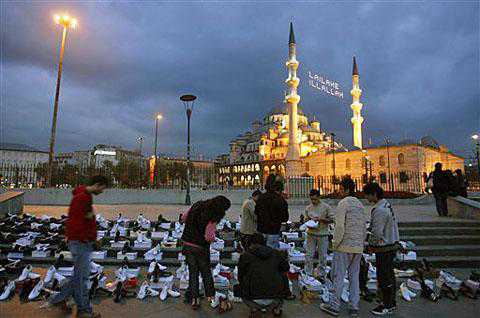Tevfik Ziyaeddin Akbulut, the chairman of the parliamentary Commission for Interior Affairs, has warned European countries that have failed the test of sincerity with respect to counterterrorism and called on them to stop lending support to terror.
Last week Ankara discussed secret support lent to terror by certain European countries, and Turkey is now preparing to file a complaint with the UN against the Netherlands and Belgium.
The death of Revolutionary People’s Liberation Party/Front (DHKP/C) leader Dursun Karataş at a hospital in the Netherlands was the straw that broke the camel’s back for Turkey. A member of the Cabinet said the Netherlands had previously rejected Turkey’s demands to return Karataş to Turkey, claiming that he was not in the Netherlands. [HYPOCRISY IS A HOMAGE THAT VICE PAYS TO VIRTUE -H]
Turkey discovered that Karataş had been in the Netherlands for cancer treatment for six months, during which Dutch Interpol did nothing about it. After receiving official statements explaining their inaction, Turkey will file complaints against the Netherlands and Belgium vis-à-vis their tolerance toward the DHKP/C.
Belgium had its share in the recent crisis as it had pursed a similar policy with respect to Fehriye Erdal, a key suspect in the 1996 murder of Özdemir Sabancı. The same Cabinet member argued that no country has immunity to be tolerant toward terror and other crimes against humanity, recalling that Germany and France had in the past shown similar indifference and that they had paid a heavy price for it.
The government official argued that the Netherlands had been caught red handed. “They did not provide the slightest piece of information about Karataş, who was being treated at a hospital in Arnhem for several months, and this is unacceptable and unjustifiable. Likewise, Belgian authorities’ attitude concerning the terrorist Erdal cannot be explained by human rights or law. How can you justify the protection afforded to terrorists who killed innocent people? These two countries are openly violating the European Convention on Extradition,” he said.
Ankara will demand that the UN must be more sensitive about tolerance afforded to terrorists as this undermines Turkey’s counterterrorism efforts.
Turkey will inform the UN of such cases in detail. The release of Erdal by Belgian courts was an act that undermined Turkey’s faith in Belgian justice. Belgium turned a deaf ear to Turkey’s repeated warnings and did not extradite Erdal. It also gave political asylum to Zübeyir Aydar, the top Kurdistan Workers’ Party (PKK) figure in Europe.
Karataş had been apprehended but released by German and French authorities. After he was caught by German police in Cologne on March 3, 1993, and later released, he was caught by the French police on Sept. 9, 1994 in France and he was released pending trial after four months.
One leftist politician was not content with Karataş’s designation as a leftist. “Their hands are stained with blood, as they sold their ideology to terrorism. It is very disconcerting that an organization that was subcontracted by the international terrorist and fascist Ergenekon organization can still be called a leftist organization,” he said.
The DHKP/C’s suspected assassination of Yaşar Günaydın, the public prosecutor of the İstanbul State Security Court (DGM), may be connected to the Ergenekon case, as Günaydın was investigating the failed assassination of former President Turgut Özal. Günaydın had launched an investigation into Workers’ Party (İP) leader Doğu Perinçek, who will be tried in the Ergenekon case, for concealing evidence.
No one is innocent
Disappointment about the country’s performance at the Olympics has given rise to several interesting assessments. A deputy from the Nationalist Movement Party (MHP) voiced an interesting shortcoming on Turkey’s part. “We discuss the performance of our athletes. But the Olympics represent a big international organization. How many Turks are working for this international event?” he asked.
The MHP deputy noted that Turkey did not have a strategy for training qualified personnel for such international organizations. “There are so many international organizations that do not employ any Turkish citizens. There are only individual cases of employment. However, even small European countries have made it an official policy to train personnel for such organizations. In our country, neither the state nor the nongovernmental organizations or universities do this. We are nonexistent in these organizations. But do we have efforts to sponsor athletes? I am unaware of any institution that sponsors athletes for international sports events. Do we provide facilities for education and training facilities for our kids who have potential for success at the Olympics?” he added.
Left may boost Turkish sports
Deputies from left-wing parties were not eager to make comments about the country’s performance at the Olympics.
One journalist attributed this to leftist parties being distant to sports, which he said was a significant deficiency for them.
A former deputy from leftist politics said such a comment was not fair and argued that only left-wing parties could boost Turkish sports. “I say this clearly: Unless leftist parties take the initiative, only coincidence will determine whether this country will have universal sportsmen or not. For success at the Olympics, you need to train your athletes starting from childhood. But you cannot give special training to children before the age of 15. This disastrous heritage of the Feb. 28 [1997 unarmed coup] process cannot be abolished by rightist parties. Only leftist parties can introduce an exemption for sports to the Compulsory Education Law,” he said. We will wait and see whether leftist parties will have the courage to propose an amendment to this law to boost Turkish sports.
Source: Today’s Zaman, 18 August 2008


